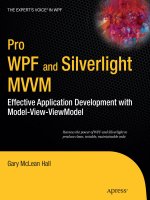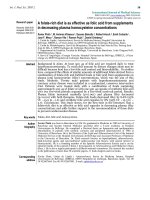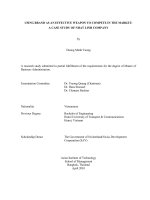Effective literature searching
Bạn đang xem bản rút gọn của tài liệu. Xem và tải ngay bản đầy đủ của tài liệu tại đây (525.24 KB, 20 trang )
Effective Literature Searching
Some frequently asked questions
Library & Archives Service
www.lshtm.ac.uk/library
I’ve never done any searching before , where should I be gin?
1
•
Define your topic
2
•
Choose the resources to search
You should work through the 5 steps of an effective literature search. Working logically through these steps
3
•
ensuresChoose
your search
is focused,
your
searchsystematic
terms and effective.
The Library has produced a handbook taking you through each step, you can download it at />
4
•
Compile the strategy and run the search
5
•
Find the full text
These are the 5 steps. You’ll notice that it is not until step 4 that you actually run your search in a database. Some people find this surprising, but it is important that you don’t miss out the
3 preparatory stages. If you don’t spend some time planning first you will find it frustrating and difficult to retrieve material relevant to your topic.
I have a rough idea of my topic, how can I tur n this into
something I can search on?
You need to work through step 1 of the literature search process: defining your topic. The next few slides will
take you through the basics to achieve this, but this help sheet gives more detailed information
/>
Firstly, you must be very specific about what it is you want to find. This may sound obvious, but you are going to
be searching a vast body of literature. There are over 20 million citations in the PubMed database alone and only
a small proportion of these will be relevant to your topic. Unless you are very clear about what you want,
retrieving these relevant items will be extremely difficult.
What do you want the literature to tell you?
Ask questions…
Question x4 by Mike Coghlan
/>Reproduced under a Creative Commons Licence
Turning our topic into a question is helpful because it forces us to think about what it is we really want to find. It is important that this question is focused. “How can maternity services be
best delivered?” is too vague and ill-defined for an effective literature search. Think about how many potential papers this could retrieve. “Which are the most effective ways to deliver
maternity services to rural populations in low-income countries” is much more appropriate. In this case we have defined our topic by thinking about a specific population and geographical
setting.
Which are the most effective ways to deliver maternity services to rural populations in low-income
countries?
Once you have developed a question you must identify the key concepts within it. Which concepts must every paper that you find address in order for it to be relevant to you? We will need
to use these concepts when we come up with our search terms.
I have highlighted the concepts that make up my question in red. Everything I find must be about maternity services, rural populations and low-income countries. If any of these concepts
are not represented in a paper then it will not be relevant to me and I don’t want to find it.
Which databases should I search?
PubMed/Medline
Embase
Global Health
Biomedicine and clinical medicine
Biomedical and clinical medicine
International public health
This is step 2 of the literature search process. The databases you choose depend very much on the search topic.
Each database covers a different topic or type of information and you must choose the ones that are most
Africa-Wideappropriate
Information
for your search question.Cochrane Library
Information from or about Africa
Healthcare interventions
CINAHL
Nursing and allied health
LSHTM database subscriptions are grouped by topic on our web-pages You may be prompted
to log-in with your Moodle username and password (begins with lon).
Popline
Web of Science
Reproductive and sexual health
All academic disciplines, good for social sciences
ELDIS
Grey literature related to development issues
These are some popular databases used at the School. More information is available in this guide Find our complete database listing at />
How do I identify appropriate search terms?
Choosing your search terms is step 3 of the literature search process. We will
need to refer back to the concepts we came up with at step 1.
A database is not cognitive, and it especially can’t understand nuances in
language. If I search for maternity services the database will not know I also
want to find papers that discuss maternity care or maternal health services.
You need to think of all the ways each of your concepts could be described in
the title or abstract of a paper. Spend some time generating this list of
keywords, your results will only be as good as what you put in.
Further information about indentifying search terms is available
/>
Which are the most effective ways to deliver maternity services to rural populations in low-income countries?
Maternity Services
•
•
•
•
•
•
•
•
•
•
Maternal health service(s)
Maternal healthcare
Maternal health care
Maternal service(s)
Maternity care
Maternity service(s)
Postpartum care/service(s)
Postnatal care/service(s)
Rural populations
•
•
•
•
•
•
Rural community/ties
Rural population(s)
Remote population(s)
Remote community/ties
Non-urban
Villages
Low income countries
•
•
•
•
•
•
•
•
Developing country/countries
Developing nation(s)
Developing world
Low resource setting
LMIC(s)
Africa(n)
South East Asia(n)
South America(n)
Prenatal care/service(s)
Antenatal care/service(s)
Here are the keywords I came up with for each of the concepts in my maternity services question. Notice how I have considered different word endings such as plurals, the databases will
not search for these automatically. You should also make sure you account for differences in UK and US spellings or terminology, and include the full name of any abbreviations.
What are subject headings?
You may also hear subject headings referred to as MeSH terms or thesaurus terms. When we
search by subject heading we are not searching the terms the author has used in the title or
the abstract, we are searching index terms that have been applied to each article to show
what it is about.
They work in much the same way as the index of a book. When we look up HIV in an index it
tells us all the pages which have content about HIV. In a similar way, using the subject heading
HIV will bring us all the items in a database about HIV – whether they have used the term
HIV, HIV-1, HIV-2, human immunodeficiency virus or something
describe
that
concept.
This is aelse
recordto
from
the Medline
database.
In the red
box are the index terms that are applied to this record
Not every database uses subject headings, and those that do
each
use
different
index
to show
what
the apaper
is about.set
It is of
these
terms that
terms. A comprehensive search will use both keywords and
subject headings. A fuller
you are searching when you search by subject heading.
explanation is available />
How do I combine my search terms together?
We are now up to step 4 of the search process, compiling
the search and running it in a database. This step is more
completely explained here />We have to input our search terms in a way that the
databases understand so that they run the search in the
way we want them to.
Most importantly, we have to use Boolean operators to join
our terms – AND & OR.
OR
AND
OR means either – we join terms with OR when we want to find any of them. OR finds
articles with one or more of our terms, so all of the blue areas in the diagram. We use
OR to join our synonyms for the same concept – we want to find anything that discusses
either maternity care OR maternal healthcare.
AND means both – if you join terms with AND you will only find items in which
those terms appear together. AND finds articles with all of our terms, so only the
blue area of the diagram. We use AND to combine our searches for different
concepts – we want to find papers discussing both maternity services AND rural
communities.
( ______ OR ______ ) AND ( _____ OR _____ OR _____ )
When we use AND & OR together in the same search line we need to use brackets to show the order in which we want our terms combined. They work in the same way as brackets
in algebra, breaking up discrete and separate sections of the search.
You can run your search as one long search string, using brackets to separate the concepts…
("maternity services" OR "maternal
health services" OR "postnatal care" OR
"postpartum care") AND ("rural
populations" OR "remote populations"
OR "rural communities" OR "remote
communities" OR non-urban OR villages)
AND ("developing country” OR "low
income country" OR africa OR "south
america" OR "south east asia")
Or in many databases you can search for each concept separately, and then combine the individual searches
together with AND at the end.
1.
2.
3.
4.
(matern* OR postnatal OR postpartum OR prenatal) and (care OR service*)
rural communit* OR remote communit* OR rural population* OR remote population* OR village* OR non-urban
developing countr* OR low-income OR africa* OR south america* OR south east asia*
1 AND 2 AND 3
I have used truncation in this search (*). Adding the truncation symbol to the root of a word will find all the possible word endings e.g. matern* will find both maternal and
maternity. You can find more tricks like this to improve your search here />
For the most comprehensive search your strategy should combine both keyword and subject heading searching. The structure will look
something like this:
1.1. Concept
1 keyword
search
(matern*
OR postnatal
OR postpartum OR prenatal) and (care OR service*)
2.2. Concept
1 subject heading search
exp Maternal Health Services/
3. 1 OR 2
1 OR 22 keyword search
4.3. Concept
5.4. Concept
2 subject heading
search
rural communit*
OR remote
communit* OR rural population* OR remote population* OR village* OR non-urban
6. 4 OR 5
5. Concept
exp Rural Health Services/ OR Rural Population/
7.
3 keyword search
8.6. Concept
5 OR 63 subject heading search
9.7. 7 ORdeveloping
8
10.3 AND 6 AND 9world OR africa* OR south america* OR south east asia*
8.
9.
10.
exp Developing Countries/
7 OR 8
3 AND 6 AND 9
Why has my search not found what I need?
Don’t expect to put together a perfect search strategy first time. Searching is an
iterative process and it often takes a couple of revisions before you have a strategy that
is effective at finding what you want.
First, look at the results you have retrieved. Most databases will highlight your search
terms in the results so you can see why a particular item was returned. Use this to
start your thinking about how the strategy could be improved.
Why has my search not found what I need?
Problem 1 – I can’t find any papers
Is the scope of your search too narrow? In this search, the strategy is very specific in that it only wants to find papers about Brazil. Expanding the focus to find potentially
Have
you checked
and American
use of syntax?
Makewould
sure you
havemore
not misspelt
relevant
material your
from spelling
other South
countries
retrieve
results. a crucial keyword, and you have used Boolean operators, truncation etc correctly.
Are
youyou
searching
the
relevant
database?
Different
databases
contain
different
does thefor
one
youof
are
using
cover your
area?
search
above
is from
Have
included
allmost
relevant
keywords
and subject
headings?
This
search
has notinformation,
identified synonyms
each
the
concepts.
This topic
means
thatThe
papers
using
terminology
Medline,
butthat
perhaps
Global
Health
andare
Popline
would find
more
results
as they
focus
on international
and reproductive
health respectively.
other than
included
in the
search
not retrieved.
The
search
would
exclude
anything
where thepublic
authorhealth
talks about
“maternal transmission”
or “vertical transmission”. You
can use the terminology found in papers you have already identified to add to your list of terms.
Why has my search not found what I need?
Problem 2 – I have too many irrelevant papers
Check your search terms, are they specific to the information you want to find? Often the same word can be used in many different contexts. In this search, nursing has been
used as a synonmyn for breast-feeding which returned many irrelevant results about the nursing profession. In cases like these you will have to decide whether the term can be
omitted from the search without loosing crucial papers.
Look out for where you have used very general terms in your search and replace these with what it is you really want to find. Participation is not a great search term as it could
mean anything. Terms like “patient participation” or “community participation” are more specific and therefore more effective.
I’ve found some useful papers, now how do I get the full text?
This is step 5 of the literature search process, finding the full text.
There are 4 ways you can do this
1.
2.
3.
4.
Using the SFX@LSHTM button from within the database. Find out how this works here
/>LSHTM Library catalogue />Using another Library – we can advise on schemes such as SCONUL Access ( and
HINARI ( />Request the material via our Document Delivery service />
How can I best manage my references?
Mendeley ( />
IT Services supports reference management software, rather than the
Library. They have written guides to two freely available, web-based
resources.
You can import references from most databases into these resources. The
guides will take you through this.
Zotero ( />
I still have some questions...
• There is lots more information available on our web-pages including resources
for more advanced searching.
• Post a question to the Library Support Conferences on Moodle
• Contact us by email









